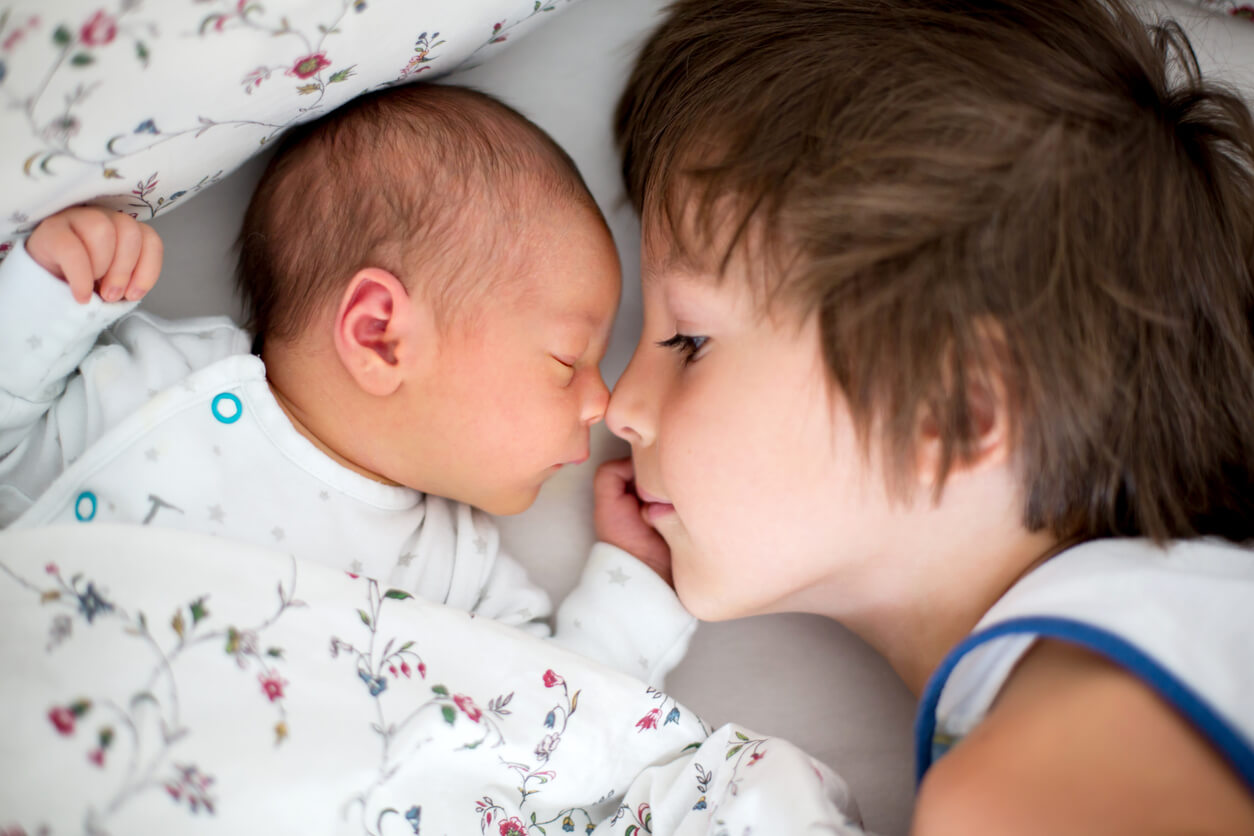How to Foster a Good Bond Between Siblings of Different Ages


Written and verified by the psychologist Sharon Capeluto
If you have siblings, the bond between you is sure to be a very special one. Siblings reciprocally influence the formation of each other’s identity. In this relationship, everything’s special. They can fight brutally and, after a while, be laughing their heads off. In turn, they explode with fury when someone hurts, mocks, or criticizes a sibling.
Mischief partners, rivals, best friends, allies, or accomplices… siblings are that much and more. Undoubtedly, sibling relationships are unique. However, the truth is that having a sibling with a small age difference isn’t the same as having one that’s significantly older or younger. This article is for those of you who want to foster a good bond between your children who are several years apart in age.
What’s the ideal age difference between children?

How far apart should siblings be in order o have a good relationship? Are two or three years best? Or is it better for them to be further apart? Usually, couples ask themselves these questions when planning their family. But, the truth is that there’s no single answer, as each alternative has its own advantages and disadvantages in regard to both parenthood and sibling bonding.
For example, when children are a few years apart, they tend to form a bond based on companionship as they grow up together. However, when having two or more young children, the difficult tasks of the early stage of parenting multiply. Therefore, fatigue, financial expenses, and the little ones’ constant dependence become protagonists in the couple’s life.
But it’s also true that there are people who perceive this as an advantage because they understand that they’ll no longer have to make the effort involved in parenting small children later on. In other words, they get it over with sooner.
Siblings with a greater age difference: Aspects to take into account
When children are eight, nine, ten, or more years apart, the situation changes. The family dynamics are very different when a baby and a teenager live together under the same roof, or a pubescent child and a person who’s about to enter adulthood. In these cases, very different worlds coexist.
To foster a good bond between them, it’s essential to tend to the needs of each one. Logically, the youngest child needs the adults to be closer, as there are many things that they can’t yet do independently. But even if the older sibling has already acquired some independence, they still need quality time with his parents.

The relationship between siblings of different ages
Rivalry and feelings of jealousy can appear in any bond between siblings, regardless of their ages. The problem doesn’t lie in the fact that one receives more attention compared to the other, as the needs don’t coincide between a young child and an adolescent or adult child. Rather, the difficulty arises when the care of one translates into the neglect of the other.
This conflictive situation is smoothed out when parents are able to give each one what they need. Perhaps the older child needs only a weekly afternoon alone with their parents, while the younger one needs much more than that. Perhaps the baby needs more cuddling than conversation, while the older child needs more dialogue than physical contact. Or maybe not. It’s a matter of listening and trying to meet both of their demands.
Another point that nurtures healthy bonding between siblings of different ages has to do with allowing genuine interaction between them without parental intervention. So, you don’t have to witness each of their encounters or include yourself in all their games, walks, or conversations. Let them live their siblinghood freely and independently, as this is how the sibling relationship will gain strength.
If you have siblings, the bond between you is sure to be a very special one. Siblings reciprocally influence the formation of each other’s identity. In this relationship, everything’s special. They can fight brutally and, after a while, be laughing their heads off. In turn, they explode with fury when someone hurts, mocks, or criticizes a sibling.
Mischief partners, rivals, best friends, allies, or accomplices… siblings are that much and more. Undoubtedly, sibling relationships are unique. However, the truth is that having a sibling with a small age difference isn’t the same as having one that’s significantly older or younger. This article is for those of you who want to foster a good bond between your children who are several years apart in age.
What’s the ideal age difference between children?

How far apart should siblings be in order o have a good relationship? Are two or three years best? Or is it better for them to be further apart? Usually, couples ask themselves these questions when planning their family. But, the truth is that there’s no single answer, as each alternative has its own advantages and disadvantages in regard to both parenthood and sibling bonding.
For example, when children are a few years apart, they tend to form a bond based on companionship as they grow up together. However, when having two or more young children, the difficult tasks of the early stage of parenting multiply. Therefore, fatigue, financial expenses, and the little ones’ constant dependence become protagonists in the couple’s life.
But it’s also true that there are people who perceive this as an advantage because they understand that they’ll no longer have to make the effort involved in parenting small children later on. In other words, they get it over with sooner.
Siblings with a greater age difference: Aspects to take into account
When children are eight, nine, ten, or more years apart, the situation changes. The family dynamics are very different when a baby and a teenager live together under the same roof, or a pubescent child and a person who’s about to enter adulthood. In these cases, very different worlds coexist.
To foster a good bond between them, it’s essential to tend to the needs of each one. Logically, the youngest child needs the adults to be closer, as there are many things that they can’t yet do independently. But even if the older sibling has already acquired some independence, they still need quality time with his parents.

The relationship between siblings of different ages
Rivalry and feelings of jealousy can appear in any bond between siblings, regardless of their ages. The problem doesn’t lie in the fact that one receives more attention compared to the other, as the needs don’t coincide between a young child and an adolescent or adult child. Rather, the difficulty arises when the care of one translates into the neglect of the other.
This conflictive situation is smoothed out when parents are able to give each one what they need. Perhaps the older child needs only a weekly afternoon alone with their parents, while the younger one needs much more than that. Perhaps the baby needs more cuddling than conversation, while the older child needs more dialogue than physical contact. Or maybe not. It’s a matter of listening and trying to meet both of their demands.
Another point that nurtures healthy bonding between siblings of different ages has to do with allowing genuine interaction between them without parental intervention. So, you don’t have to witness each of their encounters or include yourself in all their games, walks, or conversations. Let them live their siblinghood freely and independently, as this is how the sibling relationship will gain strength.
All cited sources were thoroughly reviewed by our team to ensure their quality, reliability, currency, and validity. The bibliography of this article was considered reliable and of academic or scientific accuracy.
- Bank, S, P., Kahn, M, D. (2003). The Sibling Bond (Basic Behavioral Science). Basic Books; Anniversary edición (3 Abril 2003).
- Shuguli manguia, C, Y. (2013). Estabilidad emocional. Guía de orientación sobre la preparación del niño para la llegada de un nuevo hermano dirigida a padres de familia. (Bachelor’s thesis). http://www.dspace.cordillera.edu.ec:8080/xmlui/handle/123456789/1304
This text is provided for informational purposes only and does not replace consultation with a professional. If in doubt, consult your specialist.








